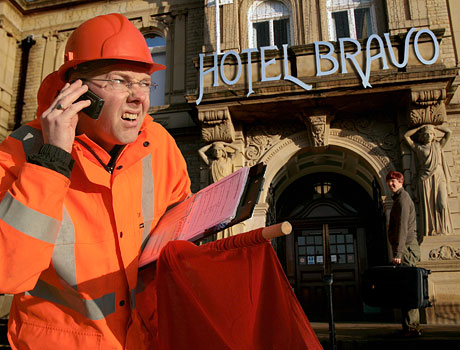|
As a fully paid up Yorkshireman, it’s always with reluctance that I venture beyond the county border and south to the capital. Partly to blame for this parochial outlook is the fine Northern tradition of thriftiness. For those of us lacking an expense account, travel on the East Coast Main Line is now so costly that my accountant’s pacemaker has to be reset each time I utter the phrase “Standard Open Return”. But last month, after selling my daughter and remortgaging the house, I picked up the phone to a ticket hotline.
Her piercing greeting left no doubt that Sandra, my reservation agent, had overdosed on happy pills and been tutored by Dale Winton. Every mundane detail was processed with excruciating enthusiasm. Still, damage to my eardrums apart, this was a smooth and lucid transaction. Before it closed, she quoted a booking reference - “hotel bravo two zero echo six foxtrot” - and even asked me to repeat it back.

If call centre operatives can reach these dizzy heights, you might wonder why members of the railway workforce sometimes fail to exhibit even the most basic of communications skills. Fact is, the delicious Sandra was recruited for her vocal talents and, from day one, training has further enhanced them. Contrast that with Joe Trackworker. With little thought for his aptitude, he’s been pushed onto a COSS or handsignaller course, force-fed a bucket-load of chewy protocols and expected to perform like a seasoned orator. Barmey, isn’t it?
It’s undeniable that the scourge of foot-in-mouth disease causes safety to lose its grip on a daily basis. At worst, it’s genuinely life-threatening. Too many incidents feature communications cock-ups, at a cost to the industry of around £20million a year. To compound these losses, our over-generous research budget is now funding the development of a ‘tool’ to quantify the financial price of each linguistic failing. Quite how this helps is anybody’s guess.
Reams of statistics and analysis simply tell us what we already know. Wishful thinking and managerial toys won’t break down the ingrained culture of informality, spawned decades ago, which prevails at operational level.
|
| Wishful thinking and managerial toys won’t break down the ingrained culture of informality, spawned decades ago, which prevails at operational level. |
|
Network Rail’s SAF6 improvement plan promises an assault. From our lowly base camp, its Himalayan aspiration is to drive up the quality of voice communications to the pinnacle of world class. This formidable climb begins with a revised module in the PTS syllabus and a voluntary day-long course, open to all frontliners. Upwards of 12,000 have sampled the free lunch so far. The target is 75,000 over three years.
It stresses the need for personal leadership whilst exploring barriers such as dialect and peer pressure. A compilation of signalbox recordings reveals some jaw-dropping hopelessness from people assessed as competent. But this thought-provoking and valiant attempt to sheepdip our safety critical flock is rather dry and short on interactivity. Those seeking to practice their technique offline - something from which most of us would benefit - were probably better served by the more-engaging Communications Forums. Full marks for effort though.
I can’t help thinking that a serious dose of realism is called for here. You can’t teach old dogs new tricks, so the adage goes. Unless he already has one, no career railwayman wandering towards retirement is likely to acquire the silver tongue of an airline pilot - a profession generally held up as a paragon of verbal virtue. Human life at trackside has very different talents to those found on a flightdeck. In any case, contrary to popular belief, air traffic control is not devoid of shortcomings.
In my view, focussing on the set menu of phonetics and phrases has been something of a diversion from our ultimate goal - ensuring every message concludes with a clear understanding. One is not dependent on the other. Protocols might appeal to committee members but they don’t play to the strengths of our trackside colleagues. Even the term ‘protocols’ is enough to turn people off.
Consistent, polished communications are a vital component of any successful business and, despite the mountain’s magnitude, the railway can rise to the challenge. Logic dictates that if, from the outset, new entrants are attuned to their importance, standards will head skywards. And we can reach the summit with today’s workforce by offering help and encouragement - ramping up inherent skills rather than imposing difficult, alien ones.
Story added 1st January 2007
|